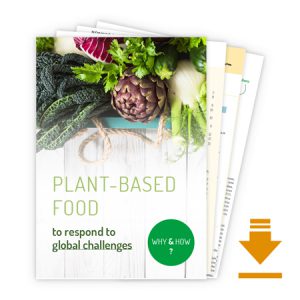All the data seem to indicate that we definitely need to evolve towards a more plant-based diet, both for our health and that of our planet. More on this subject in the Louis Bonduelle Foundation’s new white paper.
Food, nutrition, health, environmental and climate challenges all have one thing in common: plant-based food. On the global level, a lack of whole grains, fruit and vegetables and nuts and seeds in our diet is one of the top 5 nutritional factors that reduce the number of years we spend in good health, in addition to excessive salt consumption.
We still eat too much animal protein, which has a detrimental impact on the environment and is not a sustainable dietary habit. Although fruit and vegetable consumption has increased in recent years (read our 2020 monograph on the global consumption of plant-based foods), it is still well below the WHO guidelines in most countries.
The flexitarian diet: a more balanced, mainly plant-based approach to food
A plant-based diet thus means eating more plant-based foods, although this isn’t necessarily synonymous with a vegetarian diet. The EAT-Lancet Commission defined the ideal ‘plate’ that fulfils our nutritional requirements in addition to being sufficiently sustainable, to feed 10 billion people in 2050.
This ideal plate contains a variety of plant-based products (up to 850 g a day) including:
- whole grains,
- vegetables,
- fruits,
- pulses
- and nuts.
So, while it contains relatively few animal products, it is not necessarily vegetarian. They are thus advocating a flexitarian diet. The idea is to reduce, without therefore completely eliminating, your meat intake, in favour of a wide range of plant-based foods. You can continue to eat fish and dairy products in limited quantities.
Dietary guidelines in many countries around the world are evolving in step with this, encouraging populations to eat more fruit and vegetables, pulses, nuts and seeds, and to choose whole grains and whole-grain products where possible, instead of refined grains and refined cereal products.
Plant-based food in the field
While we all are aware of what we should be doing, many of us still don’t know how to do it! This is especially the case for vegetables, which continue to be woefully under-consumed. So, wouldn’t it make sense to teach children to love vegetables to make sure they adopt healthy dietary habits for the long term? That is exactly what the Louis Bonduelle Foundation has set out to achieve by supporting various projects.
The EPICALIM research programme (a food study, conducted at the Epicurium museum) showed that actions that combine culinary activities with nutrition education make children eat more vegetables during meals. It also showed that the consumption of a family of plants that is regularly shunned by children, pulses, increases significantly following a practical workshop (gardening or cooking workshop).
A white paper to respond to global challenges
In this white paper, which is entitled “Plant-based food to respond to global challenges”, we analyse the evolution of our behaviour towards a more plant-based diet.

We also give an overview of international guidelines and actual vegetable consumption in Europe and North America, in addition to a forecast of what our plate will look like in the future.
Finally, the white paper draws conclusions from the Louis Bonduelle Foundation’s research about more effective methods for sustainably increasing vegetable consumption among children.
Summary of the white paper
PART I: A plant-based diet at the crossroads of global issues
- Nutrition and health challenges
- Environmental and climate issues
- Malnutrition, undernutrition and climate change are also interlinked
- Global food production and nutritional requirements: what is not right?
- Consumption of plant-based foods
PART II: Plant-based foods at the heart of the recommendations
- How to feed the world sustainably
- How to integrate sustainability into the recommendations
- Different regions across the globe are reaching nutritional targets
- A healthy and sustainable diet: WHO recommendations
- Towards more sustainable food systems
PART III: Plant-based diets in practice
- How efficient are the different actions?
- EPICALIM: our analysis of the real impacts of preventive actions
- Extending research with our field actions.



 Onions
Onions  Fava beans
Fava beans  Choosing a Plot for Your Garden
Choosing a Plot for Your Garden 









